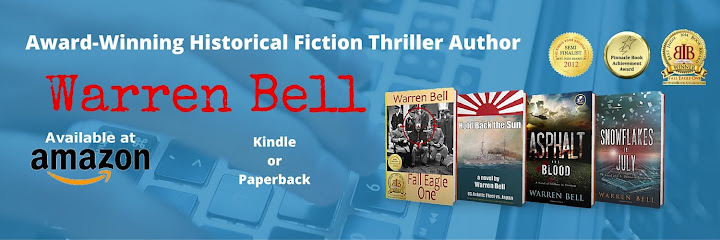The newspapers during the last few days have contained many
reviews of 2013. Many of them are gloomy.
The U.S. Congress remained gridlocked during the year, stumbling from
one crisis to another. The government was forced to shut down for several days.
Fights over the implementation of the “Affordable” Health Care Act dominated
politics and the news. Nelson Mandela passed away. The giants appear all gone,
and mere humans are left to grapple with the problems of our times.
2013 was far kinder to me. When the year began, I was
struggling to market my little-known novel, FALL EAGLE ONE, about a Nazi
attempt to kill FDR. Sales were very modest, and I had few ideas about how to
spread the word about my book. But I had asked my daughter, Karen Williams, to
help me mount an Internet marketing campaign as my Christmas present. In late
winter, we began the effort.
I already had a Facebook page, but it needed a lot of
updating. Then Karen introduced me to Twitter. As soon as I grasped the “expanding
ripples” effect of Twitter, I took to it readily. Carefully studying how successful authors were using the
media, I realized that one had to widely publicize the works of other authors
to get them to publicize mine. I began devoting over an hour per day to
Internet marketing. Meanwhile, Karen was building an author’s website for me.
By April 2013, FALL EAGLE ONE had climbed into the upper one
percent of Kindle sales and has hovered in that range for the remainder of the
year. It has 43 Amazon.com reviews with a 4.5-star out of 5 average rating. I
spend about an hour and a half a day on marketing, but it has paid off
handsomely.
I completed my second novel, HOLD BACK THE SUN, in the summer of 2013. Another World War II yarn, my new work follows
the adventures of two U.S. Asiatic Fleet lieutenants during the opening months
of the Pacific War. Karen built a YouTube trailer, which appears on my website.
We launched the Kindle version of the new book in early August, and it quickly
began to sell. When Amazon.com subdivided its bestseller lists in autumn, HOLD BACK THE SUN appeared as #8 in the historical fiction/Asian category. It soon
climbed to #3 and has been in the upper 10 all year. It has 28 Amazon.com Reviews with a 4.3-star out of 5 average rating.
My third book, ASPHALT AND BLOOD, is already in the works.
It will tell the story of how the U.S. Navy Seabees aided the Marines during
the Battle for Hue City during the Vietnam War. My target launch is for Labor
Day 2014.
I shall always remember 2013 as the year I could truthfully
add the title, “author,” after my name.
Note:
Warren Bell is a historical fiction author with two novels released and
for sale either for Kindle or in paperback from Amazon.com. Both are
set during WWII, with Fall Eagle One taking place in Europe, and Hold Back the Sun is set in the war in the Pacific. Karen Williams, Marketing for Authors specializes in Marketing and PR for Independent Authors. She can be reached through her website or at karenwilliamsmarketing@gmail.com.










.jpg)









